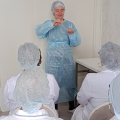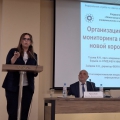A conference dedicated to current infectious diseases in the region was held in Nizhny Novgorod.
|
01 11.2024
The Oka Group Congress Center discussed issues of epidemiology of socially significant infectious diseases.
|
The 12th interregional interdisciplinary scientific and practical conference "Current infectious diseases of the Volga-Vyatka region" was held on October 31 - November 01, 2024. The conference was held in person, and an online broadcast was also organized.
The conference was attended by epidemiologists, infectious disease specialists, therapists, phthisiologists, endocrinologists and other specialists from medical and preventive and scientific institutions of the Nizhny Novgorod region, as well as St. Petersburg, Obninsk, Saransk and other cities of Russia. In total, 26 lecture reports were heard within the framework of the conference.
Specialists from the Federal Budgetary Scientific Institution NNIIEM named after Academician I.N. Blokhina of Rospotrebnadzor presented five reports on the results of their own research in the field of epidemiological and molecular genetic monitoring of socially significant diseases, as well as the development of means for their specific prevention.






